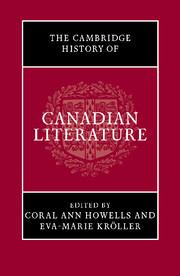Book contents
- Frontmatter
- Introduction
- PART ONE OLD AND NEW WORLD, LA NOUVELLE-FRANCE, THE CANADAS, DOMINION OF CANADA
- PART TWO THE POST-CONFEDERATION PERIOD
- PART THREE MODELS OF MODERNITY, POST-FIRST WORLD WAR
- 13 Staging personalities in modernism and realism
- 14 E. J. Pratt and the McGill poets
- 15 The 1940s and 1950s: signs of cultural change
- 16 The Centennial
- 17 Forms of non-fiction: Innis, McLuhan, Frye, and Grant
- PART FOUR AESTHETIC EXPERIMENTS, 1960 AND AFTER
- PART FIVE WRITING IN FRENCH
- Bibliography
- Index
- References
15 - The 1940s and 1950s: signs of cultural change
from PART THREE - MODELS OF MODERNITY, POST-FIRST WORLD WAR
Published online by Cambridge University Press: 28 September 2010
- Frontmatter
- Introduction
- PART ONE OLD AND NEW WORLD, LA NOUVELLE-FRANCE, THE CANADAS, DOMINION OF CANADA
- PART TWO THE POST-CONFEDERATION PERIOD
- PART THREE MODELS OF MODERNITY, POST-FIRST WORLD WAR
- 13 Staging personalities in modernism and realism
- 14 E. J. Pratt and the McGill poets
- 15 The 1940s and 1950s: signs of cultural change
- 16 The Centennial
- 17 Forms of non-fiction: Innis, McLuhan, Frye, and Grant
- PART FOUR AESTHETIC EXPERIMENTS, 1960 AND AFTER
- PART FIVE WRITING IN FRENCH
- Bibliography
- Index
- References
Summary
Looking back to the late 1930s, the novelist Hugh MacLennan described Canada as “an uncharacterized country,” unrealized and unappreciated by Canadians themselves, while the rest of the world “had never thought about Canada at all, and knew nothing whatever about us.” By contrast, in the late 1950s he was speaking confidently about a national transformation: “There are many evidences that the Canadian scene at the moment can provide themes as significant to old countries in Europe, and to the United States, as can be found anywhere. If this is true, there is no need any longer to ask whether there can be a Canadian literature. There is one now.” This magisterial overview by the major literary spokesman for Canadian nationalism in the 1940s and 50s provides a framework for this chapter. These twenty years form a border zone between old and new, when the patterns of colonial Canada were radically disrupted by the Second World War, followed by the optimistic years of post-war reconstruction and attempts to forge a new national consciousness for an independent North American nation. Canadian Confederation seemed complete when Newfoundland joined in 1949, but the province’s discontent lingers into present-day politics and literature. Inevitably this was a period of conflicting political and cultural interests: nationalism versus regionalism, biculturalism and bilingualism; literary modernism versus traditionalism; voices of British-centered cultural authority versus the “other” voices of regional writers, ethnic writers, women, and French Canadians. Altogether these unresolved tensions produced a far more contentious and livelier literary culture than many historians have been willing to acknowledge.
- Type
- Chapter
- Information
- The Cambridge History of Canadian Literature , pp. 289 - 311Publisher: Cambridge University PressPrint publication year: 2009



